Keynote Addresses
2019 Symposium Keynote Address
Make Your Home Among Strangers: A Presentation with Jennine Capó Crucet
Jennine Capó Crucet
Thursday, April 18, 2019, 7 p.m.
Goodrich Chapel
 Jennine Capó Crucet is the author of the novel Make Your Home Among Strangers, winner of the International Latino Book Award for Best Latino-themed Fiction and a New York Times Book Review Editor’s Choice. The 2015 work was chosen as the selection for the fall 2018 Richard M. Smith Common Reading Experience, a component of the William Atwell Brown, Jr., and Mary Brown Vacin First-Year Experience at Albion College.
Jennine Capó Crucet is the author of the novel Make Your Home Among Strangers, winner of the International Latino Book Award for Best Latino-themed Fiction and a New York Times Book Review Editor’s Choice. The 2015 work was chosen as the selection for the fall 2018 Richard M. Smith Common Reading Experience, a component of the William Atwell Brown, Jr., and Mary Brown Vacin First-Year Experience at Albion College.
Crucet’s story collection How to Leave Hialeah won the Iowa Short Fiction Prize, the John Gardner Book Award and the Devil’s Kitchen Reading Award, and was named a Best Book of the Year by the Miami Herald, the Miami New Times, and the Latinidad List.
A PEN/O. Henry Prize winner and a Bread Loaf Fellow, Crucet’s writing has appeared in Guernica, Ploughshares, Epoch, The Rumpus, Prairie Schooner, and other print and digital magazines. Originally from Miami, Florida, she is an associate professor of English and Ethnic Studies at the University of Nebraska-Lincoln.
Reception and book-signing immediately following the program in Bobbitt Visual Arts Center.
2018 Joseph S. Calvaruso Keynote Address
“The Foundations and Practices of a Civil and Kind Society”
Dacher Keltner
Thursday, April 19, 2018, 7 p.m.
Goodrich Chapel
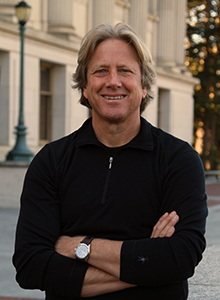
Through his research and teaching, Dacher Keltner focuses on the biological and evolutionary origins of compassion, awe, love, beauty, power, social class and inequality. As professor of psychology at the University of California, Berkeley, and director of the Berkeley Social Interaction Lab, he is a leading scholar in the study of emotion, including a new project on awe around the globe. Keltner also serves as faculty director of the Berkeley Greater Good Science Center.
Keltner is the author of The Power Paradox: How We Gain and Lose Influence (2016) and the best-selling Born to Be Good: The Science of a Meaningful Life (2009); he is also an editor of The Compassionate Instinct: The Science of Human Goodness (2010). Keltner has published more than 190 scientific articles, including seminal works on the psychology of awe (Keltner & Haidt, 2003), and is the co-author of two textbooks. He has written for The New York Times Magazine, The Times of London and Utne Reader, and his research has been covered in Time, Newsweek, The Wall Street Journal, The New York Times, CNN, NPR and the BBC as well as many other outlets.
In addition to his university work and research, Keltner has collaborated on projects at Facebook and Google, and served as a scientific consultant for Pixar’s highly acclaimed 2015 film Inside Out, for which he helped revise the story emphasizing the neurophysiological findings that human emotions are mirrored in interpersonal relationships and can be significantly moderated by them. He is also featured in Tom Shadyac’s 2011 documentary I Am.
Keltner has twice presented his research to His Holiness the Dalai Lama as part of a continuing dialogue between the Dalai Lama and scientists. A recipient of outstanding teacher and research mentor awards from UC Berkeley, Keltner has seen 20 of his Ph.D. students and postdoctoral fellows become professors. Wired magazine has rated the podcasts of his “Human Emotion” course as one of the five best academic podcasts in the country, and Utne Reader named Keltner as one of its 50 Visionaries of 2008.
2017 Joseph S. Calvaruso Keynote Address
“Supreme Allied Commander; President of the United States; Private Citizen”
Mary Jean Eisenhower
Thursday, April 20, 2017, 7 p.m.
Goodrich Chapel
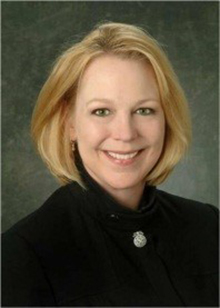
Mary Jean Eisenhower was born in Washington, D.C., during her grandfather Dwight D. Eisenhower’s first term in office as president of the United States. She was christened in the Blue Room of the White House and grew up in Gettysburg, Pennsylvania, close to the Eisenhower Farm, where President Eisenhower eventually retired. Her father, John, was named U.S. Ambassador to Belgium in 1969, and she lived in Brussels with her family until 1972.
Eisenhower is president and chief executive officer of People to People International, which was founded by President Eisenhower on September 11, 1956 and became a private organization in 1961. She joined PTPI hoping to carry on her grandfather’s dream, but it has since become a dream of her own.
In 1999 she established the PTPI Friendship Fund following an inspirational visit to an orphanage in Morocco. To date, the fund has provided assistance to many causes, including the global humanitarian eradication of landmines; earthquake relief in India; disaster relief to victims of the September 11, 2001 attacks and their families; support of schools for the underprivileged in China and Sri Lanka; a home for leukemia victims and their families in Cuba; Japan tsunami relief; and efforts in Rwanda and Haiti.
Following September 11, 2001, Eisenhower’s focus intensified toward getting young people from around the world together to learn about each other and to engage in conflict management. Her vision resulted in Peace Camp 2003: An Evolution of Thought and Action and The Global Peace Initiative. The efforts have brought people from diverse areas, representing more than 30 nationalities, together in Egypt, Jordan and Turkey to discuss issues and reach a better understanding of their unique and individual cultures. The program remains active today.
Eisenhower has received the Knight of Peace Award from the International University in Assisi, Italy; the Medal of Honor from the Slovak Republic; the Consular Corps Award of Excellence; The Harry S. Truman Award for Public Service; Friendship Ambassador recognition from The Peoples’ Republic of China; and the Friend of Foreign Service Award, Taiwan, among others. A recipient of four honorary doctorate degrees, Eisenhower has also served as a fellow at Stanford University and in the Churchill Institute at Westminster College (Missouri).
2016 Joseph S. Calvaruso Keynote Address
“The Secret to Unleashing Inner Greatness”
Benjamin Jealous
Thursday, April 21, 2016, 7 p.m.
Goodrich Chapel
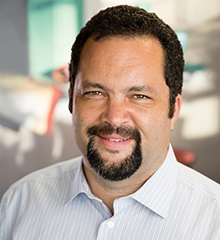
Important update, April 18, 2016: Morris Dees, co-founder and chief trial attorney of the Southern Poverty Law Center, was originally scheduled to give the 2016 Joseph S. Calvaruso Keynote, but is unable to do so due to health concerns.
Benjamin Jealous is the former president and CEO of the NAACP. He is now a partner at the Silicon Valley venture capital firm Kapor Capital, where he invests in high-growth companies that have a positive social impact and continues his goal of increasing opportunities for minorities in the tech economy.
A Rhodes Scholar, Jealous was named by Fortune and Time magazines to their “Top 40 Under 40” lists and was named a Young Global Leader by the World Economic Forum. Jealous’ new book, Reach: 40 Black Men Speak on Living, Leading, and Succeeding, features personal essays from prominent figures in the black community.
The youngest president in NAACP history, he began his career at age 18 opening mail at the NAACP Legal Defense Fund. Jealous has been a leader of successful state and local movements to ban the death penalty, outlaw racial profiling, defend voting rights, secure marriage equality and end mass incarceration.
Under his leadership from 2008 to 2013, the NAACP grew to be the largest civil rights organization online and on mobile, and became the largest community-based nonpartisan voter registration operation in the country. Jealous’ leadership at the NAACP included bringing environmentalist organizations into the fight to protect voting rights, and convincing well-known conservatives to join the NAACP.
Prior to leading the NAACP, he spent 15 years as a journalist and community organizer. While at Mississippi’s Jackson Advocate newspaper, his investigations were credited with exposing corruption at a state penitentiary and proving the innocence of a black farmer framed for arson. While at Amnesty International, he led successful efforts to outlaw prison rape, expose the increasing trend of children being sentenced to life without the possibility of parole, and draw attention to expanded racial profiling in the wake of the September 11, 2001 terrorist attacks.
2015 Joseph S. Calvaruso Keynote Address
“Before It Strikes: Viral Forecasting for Pandemic Prevention”
Nathan Wolfe
April 23, 2015
7 p.m., Goodrich Chapel
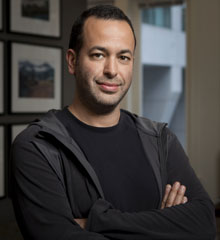
The Indiana Jones of virus hunting, Nathan Wolfe travels the world to track, study, and eradicate the next pandemic before it strikes. One of Time’s 100 Most Influential People in the World for 2011, this Viral Storm author draws on his breakthrough discoveries to tell us where viruses come from, why they spread, and how to stop them.
“Virus Hunter” Nathan Wolfe rethinks pandemic control for our globalized world. By concentrating on how epidemic diseases—such as HIV, SARS, and West Nile—all stem from human contact with infected animals, he is able to discover new threatening viruses where they first emerge. According to Wired magazine, “Wolfe’s brand of globe-trotting echoes an almost Victorian scientific ethic, an expedition to catalog the unseen menagerie of the world.” His debut book, The Viral Storm, is an “engrossing and fast-paced chronicle of medical exploration and discovery” (Publisher’s Weekly) that takes readers from the jungles of Africa to Wolfe’s state-of-the-art labs, shedding light on the often overlooked but ultimately critical field of microbiology. It was published in six languages and shortlisted for the Royal Society’s Winton Prize.
Wolfe is the Lorry I. Lokey Business Wire Consulting Professor in Human Biology at Stanford University; the Founder and CEO of Metabiota, a company that specializes in microbiological research, products, and services; and the Chairman of Global Viral, a non-profit that promotes understanding, exploration, and stewardship of the microbial world. Wolfe was named a Rolling Stone “100 Agents of Change,” a National Geographic Emerging Explorer, and a World Economic Forum Young Global Leader. He is also the winner of the NIH Director’s Pioneer Award. Wolfe has received over $60 million in grants and contracts from Google, the National Institutes of Health, the National Science Foundation, the Bill & Melinda Gates Foundation, and the U.S. Department of Defense, among others—making him a man poised to eradicate pandemics before they even happen.
Greening of the Great Lakes
Nathan Wolfe spoke with Kirk Heinze, ’70, on the April 12 edition of “Greening of the Great Lakes” (WJR-AM 760, Detroit).
2014 Joseph S. Calvaruso Keynote Address
“A Brighter Light at the End of the Tunnel: The Optimistic Future of Energy and Environment”
Richard Alley
April 24, 2014
7 p.m., Goodrich Chapel
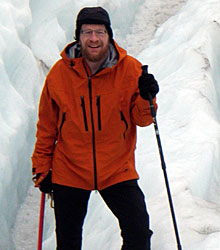
Teacher, researcher and author Richard Alley is Evan Pugh Professor of Geosciences and associate of the Earth and Environmental Systems Institute at The Pennsylvania State University. Alley has spent 14 field seasons on great ice sheets in Antarctica, Greenland and Alaska, gathering data on climate and sea-level change. His development of future climate-change models earned him a seat on the United Nations’ Intergovernmental Panel on Climate Change, which was a co-recipient of the 2007 Nobel Peace Prize.
Alley is past chair of the National Research Council’s Panel on Abrupt Climate Change, and has provided climate-change information to top federal officials including a U.S. vice president and members and committees of the U.S. Senate and House of Representatives. Committed to educating the general public as well, Alley was presenter for the PBS program Earth: The Operators’ Manual. He wrote a companion book for the PBS series and a popular account of climate change and ice cores, The Two-Mile Time Machine, which was named Phi Beta Kappa’s Science Book of the Year in 2001.
Alley is a member of the National Academy of Sciences and has earned numerous research awards, including the Tyler Prize for Environmental Achievement, the Heinz Prize, the Revelle Medal of the American Geophysical Union and the Seligman Crystal of the International Glaciological Society. He has won four teaching awards at Penn State, and his public service has been recognized with the American Association for the Advancement of Science Public Engagement with Science Award, the Public Service Award of the Geological Society of America and the American Geological Institute Award for Outstanding Contribution to Public Understanding of the Geosciences.
Alley will receive the National Academy of Sciences’ triennial Arthur L. Day Prize and Lectureship on April 27, 2014.
2013 Joseph S. Calvaruso Keynote Address
“The Very Small Things of Life”
Alexander McCall Smith
Thursday, April 18, 2013
7:00 p.m., Goodrich Chapel
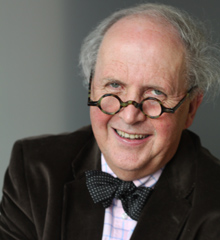
Alexander McCall Smith has written and contributed to more than 100 books ranging from specialist academic titles to children’s literature. He is best known for his No. 1 Ladies’ Detective Agency series, which to date has been translated into 45 languages and sold over 20 million copies worldwide. The series, which was adapted for BBC Radio and HBO television, has inspired a cookbook and led McCall Smith to share the young Precious Ramotswe’s story in a series of children’s books.
While he has written many popular stand-alone novels and short stories, McCall Smith is a master of series fiction, including The Sunday Philosophy Club, Portuguese Irregular Verbs, and three children’s series. Fascinated with the challenge of writing to deadline, McCall Smith began two other series with novels written in installments. 44 Scotland Street was a cultural obsession when published in weekday installments in the Scotsman newspaper. Corduroy Mansions was likewise originally published and podcasted serially by the United Kingdom’s Daily Telegraph. McCall Smith is currently working on a book about W. H. Auden, scheduled for publication by Princeton University Press in 2014.
McCall Smith was born in what is now Zimbabwe and was educated there and in Scotland. He first returned to Africa to help establish a new law school at the University of Botswana. Now a professor emeritus of medical law at the University of Edinburgh, he also served as vice chairman of the Human Genetics Commission of the United Kingdom, chairman of the British Medical Journal Ethics Committee, and as a member of the International Bioethics Commission of UNESCO.
McCall Smith is the recipient of numerous awards, including the Crime Writers’ Association’s Dagger in the Library Award, the United Kingdom’s Author of the Year Award (2004), the Saga Award for Wit, and Sweden’s Martin Beck Award. In 2007 he was made a Commander of the British Empire for his services to literature. He holds honorary doctorates from 12 universities, and the Presidential Order of Merit given by the president of Botswana. He lives in Edinburgh.
2012 Joseph S. Calvaruso Keynote Address
“The Man Made Flu Debate: Putting the ‘Public’ Back in Public Health”
Laurie Garrett
7:00 p.m., Thursday, April 19, 2012
Towsley Lecture Hall
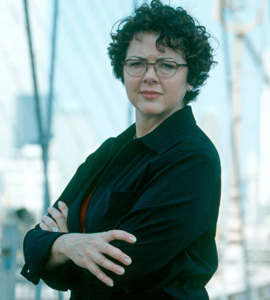
Best-selling author Laurie Garrett is the only writer ever to have been awarded all three of the Big “Ps” of journalism: the Peabody, the Polk and the Pulitzer. Turning that talent to international policy, Garrett is currently the senior fellow for global health at the Council on Foreign Relations in New York. In that capacity, she has reported on topics ranging from HIV and other disease pandemics to global health challenges related to international financial crises. She has particular expertise in newly emerging and re-emerging diseases, bioterrorism, and the intersection of public health, foreign policy and national security.
Garrett has written several popular and critically acclaimed books, including The Coming Plague: Newly Emerging Diseases in a World Out of Balance, Betrayal of Trust: The Collapse of Global Public Health, and I Heard the Sirens Scream: How Americans Responded to the 9/11 and Anthrax Attacks.
Garrett is a member of the National Association of Science Writers, and served as the organization’s first president during the 1990s. She currently serves on the advisory board for the Noguchi Prize, the François-Xavier Bagnoud Center for Health and Human Rights, and the Health Worker Global Policy Advisory Group, and is a principal member of the Modernizing Foreign Assistance Network. Garrett also chairs the scientific advisory panel to the United Nations Commission on HIV Prevention in collaboration with UNAIDS.
Garrett earned a degree in biology from the University of California Santa Cruz and did graduate work at the University of California Berkeley. While writing The Coming Plague, Garrett was a graduate fellow in Harvard’s School of Public Health. She received an Alumni Achievement Award from the University of California and honorary doctorates from Georgetown University, Illinois Wesleyan University and the University of Massachusetts, Lowell. In 2011 Garrett was named one of the “45 Greatest Alumni” of the University of California Santa Cruz, on the 45th anniversary of the school’s creation.
2011 Joseph S. Calvaruso Keynote Address
“The Story of Stuff”
Annie Leonard
7:00 p.m., Thursday, April 14, 2011
Goodrich Chapel
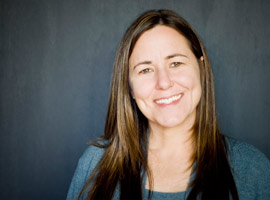
Annie Leonard is author of The Story of Stuff, the book, published by Free Press of Simon and Schuster on March 9, 2010.
Annie has spent nearly two decades investigating and organizing on environmental health and justice issues. She has traveled to 40 countries, visiting literally hundreds of factories where our stuff is made and dumps where our stuff is dumped. Witnessing firsthand the horrendous impacts of both over- and under- consumption around the world, Annie is fiercely dedicated to reclaiming and transforming our industrial and economic systems so they serve, rather than undermine, ecological sustainability and social equity.
Annie is currently the Director of The Story of Stuff Project. Prior to this, most recently, Annie coordinated the Funders Workgroup for Sustainable Production and Consumption, a funder collaborative seeking to address the hidden environmental and social impacts of current systems of making, using and throwing away all the stuff of daily life.
She has also worked with GAIA (Global Alliance for Incinerator Alternatives), Health Care Without Harm, Essential Action and Greenpeace International.
Annie is currently on the boards of International Forum for Globalization and GAIA and has previously served on the Boards of the Grassroots Recycling Network, the Environmental Health Fund, Global Greengrants India and Greenpeace India. She did her undergraduate studies at Barnard College, Columbia University and graduate work in City and Regional Planning at Cornell, both in New York. She is currently based in the Bay Area, California.
2010 Joseph S. Calvaruso Keynote Address
“Between Two Worlds: An Evening With Mira Nair”
Mira Nair
7:00 p.m., Thursday, April 22, 2010
Goodrich Chapel

Mira Nair is the rare, prolific filmmaker who fluidly moves between Hollywood and independent cinema. After several years of making documentary films, Mira Nair made a stunning entry on to the world stage with her first feature, SALAAM BOMBAY! (1988), now hailed as a classic. The film received more than 25 international awards, including an Academy Award Nomination for Best Foreign Film, BAFTA, and the Camera D’Or (for best first feature) and Prix du Publique (for most popular entry) at the Cannes Film Festival in 1988.
In the following decade, Nair directed four features: MISSISSIPPI MASALA (1991), THE PEREZ FAMILY (1995), KAMA SUTRA: A TALE of LOVE (1996), and MY OWN COUNTRY (1998). In 2001, Nair’s MONSOON WEDDING won the Golden Lion at the Venice Film Festival and was nominated for a Golden Globe and a BAFTA, becoming one of the highest grossing foreign films of all time. In 2002, Nair directed HYSTERICAL BLINDNESS for HBO which gave the channel its highest original film ratings ever, winning a Golden Globe for star Uma Thurman, and 3 Emmy Awards for Gena Rowlands, Ben Gazzara and design. In 2004, Nair directed Reese Witherspoon as Becky Sharp in Focus Features’ stunning adaptation of Thackeray’s VANITY FAIR. A year later, Nair’s adaptation of Jhumpa Lahiri’s bestselling novel THE NAMESAKE became another critical and commercial success for the director. Her latest film, Amelia, starring Hilary Swank and Richard Gere, has sparked a fresh wave of interest in one of America’s first (and most enduring) celebrities and proto-feminists, Amelia Earhart.
A long time activist, Nair divides her energies between filmmaking and her two successful non-profit organisations. In 1988 she used the profits of SALAAM BOMBAY! to create the Salaam Baalak Trust which has directly impacted government policy on streetchildren in India. 20 years later, the trust’s 25 centers provide a safe and nurturing environment for 5000 street children annually. In 2005 Nair founded Maisha, a filmmakers’ training program based in East Africa. In its 5 years of operation, Maisha has trained hundreds of students from Uganda, Kenya, Rwanda and Tanzania in screenwriting, directing, producing, acting, sound design, editing, and cinematography.
Equally committed to the short film form, Nair has directed six films, all of which are included on the Criterion Collection’s forthcoming compilation of her work. Following the tragic events of September 11, 2001, Mira joined a group of eleven renowned filmmakers; her film is a retelling of a true story of a mother’s search for her son who did not return home on that fateful day. In 2007 Nair’s New York based production company, Mirabai Films, produced AIDS JAAGO, a series of 4 short films made by India’s cutting-edge directors and stars. The series, designed to help de-stigmatize AIDS in India, has been seen by over 2 million viewers worldwide. Nair’s own short film for the series, called MIGRATION, deals with AIDS as the class leveler in society by following its transmission through interweaving stories linking rural and urban India. Nair also directed a segment of the feature film ‘8’ as one of eight directors each creating a short film to address a different Millienium Development Goal. Her film,”How Can It Be” deals with gender equality. “Kosher Vegetarian”, Mira’s segment of the feature film NEW YORK, I LOVE YOU, stars Natalie Portman and Irrfan Khan.
After the release of AMELIA, Ms. Nair has returned to the theatre from where she started, directing a spectacular musical on Broadway based on her beloved film, MONSOON WEDDING. Her forthcoming feature will be an adaptation of Mohsin Hamid’s bestselling novel, THE RELUCTANT FUNDAMENTALIST, to be filmed in New York, Pakistan and Chile in 2010.
Mira Nair was born in India and educated at both Delhi University and Harvard. She currently lives in New York City and Kampala, Uganda with her husband and son.
2009 Joseph S. Calvaruso Keynote Address Featuring
“A Nobel Laureate’s Perspective on the Middle East”
David Trimble
Thursday, April 23, 2009, 7 p.m.
Goodrich Chapel
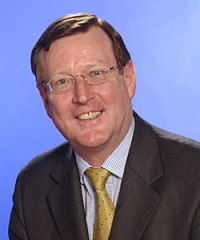
Northern Ireland leader David Trimble received the Nobel Peace Prize in 1998 following the historic Belfast Agreement in April of that year that led to a peaceful resolution of the conflict in his native country. He shared the award with John Hume. The Belfast Agreement mapped out a power-sharing arrangement between unionists and nationalists in Northern Ireland, repaired relationships between Northern Ireland and the Irish Republic, and between Ireland and Britain, and set the agenda for a lasting peace.
After a distinguished career as a law faculty member at Queen’s University in Belfast, Trimble entered politics in 1990 and became the leader of the Ulster Unionist Party in 1995. His success in establishing the peace agreement led to his election as first minister of the Northern Ireland Assembly in 1998. Trimble was re-elected as first minister in 2001.
In 2006, Trimble was created Lord Trimble of Lisnagarvey and assumed a seat in the British House of Lords. He joined the Conservative Party in 2007. His tenure in the House of Lords has been marked by a particular interest in the progress of the Israeli-Palestinian negotiations as well as British-Irish political relations.
In accepting the Nobel Prize, Trimble expressed his admiration for the “politicians of the possible,” those who through the course of history have sought “to make a working peace, not in some perfect world, that never was, but in this, the flawed world, which is our only workshop.”
During the Calvaruso Lecture, Trimble will share the lessons he learned in negotiating the Belfast Agreement, showing how they may hold the key to ending the similar conflict between Palestine and Israel, and between the Sunnis and the Shiites. How do warring factions of different political and religious beliefs, with generations of violence toward each other, move toward disarmament; and how do they do it with words, not weapons? What needs to be the catalyst for change, and how do we begin? Trimble brings both political acumen and humanitarianism to his subject.
2008 Joseph S. Calvaruso Keynote Address
“An Evening With Carl Hiaasen”
Carl Hiaasen
7:00 p.m., Thursday, April 24, 2008
Goodrich Chapel
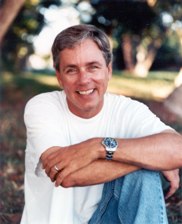
Carl Hiaasen is a noted author, investigative reporter, and newspaper columnist. He has carved out a career as a vocal champion of the environment, foe of corruption, and scathing satirical novelist. A bestselling author, award-winning newspaper columnist, and dogged investigative reporter, Hiaasen has been called “America’s finest satirical novelist” by the London Observer.
Dave Barry, Hiaasen’s colleague at the Miami Herald, described him as “one of South Florida’s most vital natural resources, a relentlessly sane voice in a howling hurricane of hypocrisy, hokum and hype.” The New York Times compared him to Preston Sturges, Woody Allen, and S.J. Perelman. Hiaasen has been nominated three times for a Pulitzer Prize, and he received the Damon Runyon Award for his journalism and commentary from the Denver Press Club in 2003-04.
Tourist Season, published in 1986, was Hiaasen’s first solo novel. GQ magazine called it “one of the 10 best destination reads of all time.” Since then, Hiaasen has published a string of successful books in 33 languages, including Strip Tease, Stormy Weather, Lucky You, Sick Puppy, Basket Case, Skinny Dip, and Naked Came the Manatee, which featured different chapters written by several well-known Florida authors. Strip Tease became a major motion picture in 1996 starring Demi Moore and Burt Reynolds. Hiaasen is also the author of two novels for young readers: Flush and Hoot. Hoot was named a Newberry Honor book, and a film version was produced by Jimmy Buffett for New Line Cinema. Hiaasen has published a non-fiction book about the Disney empire and its grip on American culture, as well as two collections of his columns. His latest book, Downhill Lie, a confessional about Hiaasen’s return to the fairways after a 32-year absence, will be published in May.
“In a place as wild as South Florida,” Hiaasen has written, “true-life events are almost too big and too weird to be dealt with appropriately in a newspaper. The journalism feeds the imagination, which feeds the fiction.”
A Florida native and graduate of the University of Florida, Hiaasen joined the Miami Herald at age 23 as a general assignment reporter and went on to work for the newspaper’s weekly magazine and prize-winning investigations team. Since 1985, he has written a regular column, which appears on most Sundays in the Herald’s opinion pages.
2007 Joseph S. Calvaruso Keynote Address
“The Stuff of Thought: Language as a Window into Human Nature”
Steven Pinker
7:00 p.m., Thursday, April 26, 2007
Goodrich Chapel
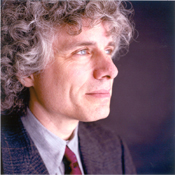
In choosing him as one of the world’s 100 Most Influential People, in 2004, TIME magazine postulated that “every half-century… an eminent Harvard psychologist crystallizes an intellectual era… [Steven Pinker] seems poised to keep its tradition alive.” One of the world’s leading experts on language and the mind, and a founding scholar in the field of evolutionary psychology, Steven Pinker asks audacious questions about the true nature of our humanity, and then boldly sets out to answer them. Pinker simultaneously enlightens and confounds academia and the public alike with his revolutionary understanding of the interconnectedness of language, instinct, consciousness, emotions, and neurology.
Pinker is the author of the New York Times bestseller and Pulitzer Prize finalist The Blank Slate: The Modern Denial of Human Nature. His earlier bestsellers include the Pulitzer finalist How the Mind Works; his classic, The Language Instinct; and the book popularizing his own research, Words and Rules: The Ingredients of Language. Pinker’s next book, The Stuff of Thought: Language as a Window into Human Nature, is already enjoying brisk sales on Amazon.com, five months before its release in September. Pinker has written countless academic articles and frequently contributes to a variety of mainstream publications including the New York Times, Nature, Atlantic Monthly, Slate, and TIME.
Appointed Harvard University’s Johnstone Family Professor of Psychology in 2003, Pinker previously served on the faculties of the Massachusetts Institute of Technology and Stanford University. He is also a fellow of several scholarly societies, including the American Academy of Arts and Sciences and the American Association for the Advancement of Science. Pinker has received numerous awards, including the Troland Research Prize from the National Academy of Sciences and five prizes from the American Psychological Association. In addition to this recognition for his research, he has won a number of teaching prizes, is included in the Esquire Register of Outstanding Men and Women, and was named among the Newsweek 100 Americans for the 21st Century.
A native of Montreal, Pinker is a graduate of McGill University and holds a doctorate in psychology from Harvard.
2006 Joseph S. Calvaruso Keynote Address
“The Regina Carter Quintet: An Evening of Jazz and Conversation”
Regina Carter
7:00 p.m., Thursday, April 27, 2006
Goodrich Chapel

Concert of Regina Carter in Genoa with Paganini Violin
Photo: Luca Zennaro
The Elkin Isaac Research Symposium Joseph S. Calvaruso Keynote Address was presented by internationally acclaimed jazz violinist Regina Carter. During her recent appearance at Lincoln Center, Ms. Carter’s accolades included this note: “The rising star slot is for lush and adventurous violinist Regina Carter, who continues to astound with the breadth of her vision and sophistication of her sound.”
Regina Carter’s career has been a veritable crescendo of success that shows no sign of letting up. She is on a mission: to make a meaningful musical contribution and do it on her own terms. Indeed, she tours with relentless purpose and a seemingly endless supply of energy. Over the past seven years, Ms. Carter and her group have brought audiences to their feet with exhilarating performances worldwide.
During the 2006/2007 season, Ms. Carter will continue to lead her group through an extensive, national and international tour. Along the way, she will perform music from her critically acclaimed release, Paganini: After A Dream, along with music from her new release, I’ll Be Seeing You: A Sentimental Journey, due out in June of 2006, both on the Verve record label.
In December 2001, Regina Carter traveled to Genoa, Italy and made history: She became the first jazz musician and first African American to play the legendary Guarneri del Gesu violin owned by classical music virtuoso and composer Nicolo Paganini. Less than a year later, Carter returned to Genoa to accomplish another milestone-using the treasured violin to record her classical-infused album.
Regina Carter’s recent triumphs by no means came without paying her dues as a side person, a student and her early musical experiences, in her hometown, Detroit, Michigan. Carter’s master classes with violin giants, Itzhak Perlman and Yehudi Menuhin, as well as her association as a member of the Detroit Civic Symphony Orchestra and with the pop-funk group, Brainstorm, provided the needed experience to play with a range of artists. Ms. Carter has had the opportunity to perform, with such jazz luminaries as, Ray Brown, Dr. Billy Taylor, Marian McPartland, Kenny Barron, Wynton Marsalis, Randy Weston and Cassandra Wilson. She has also performed with POP icons, Dolly Parton and Billy Joel. During the 2002 – 2003 season, Ms. Carter and her touring band began performing with numerous orchestras including, the Atlanta Symphony, the Milwaukee Symphony and the Minnesota Orchestra. Ms. Carter and her band also performed a special engagement with the Boston Pops, featuring classical virtuoso, Nadja Salerno Sonnenberg and celtic star, Eileen Ivers. Together, the three violinists debuted a song written especially for them, by Chris Brubeck (Dave Brubeck’s son), entitled, “Interplay.”
Just as prolific as her accomplishments on stage are Carter’s performances on record. Included in her discography, along with recordings with Patti Labelle Aretha Franklin, Mary J. Blige and Lauryn Hill are recordings with vocalists, Cassandra Wilson and Carmen Lundy, trombonist, Steve Turre, pianists Kenny Barron and Danilo Perez, guitarist Rodney Jones, saxophonist James Carter, Quartet Indigo, led by cellist, Akua Dixon and the String Trio of New York.
Her influences have ranged from R&B to East Indian, to classical music. As a college student, Carter took on a double major in classical music and African American music at both the prestigious New England Conservatory and Oakland University in Rochester, Michigan, where she earned a Bachelor of Arts degree in Performance.
Regina currently has five discs under her own name, two on Atlantic Records, Regina Carter (1995) and Something for Grace (1997). In 1998 Regina changed record labels and in the spring of 1999 Rhythms of the Heart made it’s debut under the auspices of VERVE Records (Universal). Her fourth CD, Motor City Moments, was released in September 2000 and is a tribute to the musical legacy of her hometown of Detroit. Freefall, a collaboration with pianist Kenny Barron was released in the spring of 2001 and was nominated for a GRAMMY Award in February 2002. Her current CD, Paganini: After A Dream, was released in April 2003. Her new release, I’ll Be Seeing You: A Sentimental Journey, was just recorded and will make it’s debut, in June of 2006. On this disc, Regina recorded music from the 20’s, 30’s and 40’s and it is a posthumous tribute to her mother.
Regina Carter continues to reveal a distinctly diverse musical personality. She’s become one of the most popular young violinists in modern music today.
2005 Joseph S. Calvaruso Keynote Address
“The Future of Life”
Edward O. Wilson
7:00 p.m., Thursday, April 21, 2005
Goodrich Chapel
Edward O. Wilson is one of the most highly respected scientists in the world today. Hailed as “the new Darwin” and one of “America’s 25 Most Influential People” by Time Magazine, Wilson won Pulitzer Prizes in 1979 and 1991 for his books On Human Nature and The Ants. Considered by many to be the father of the modern environmental movement, Wilson has made enormous contributions to the field of conservation.
In his most recent book, the bestselling The Future of Life (2002), Wilson offers a plan for saving the earth, drawing from science, economics and ethics to argue that proper stewardship of the earth’s bio-diversity is not an option—it is a necessity. In 1975 Wilson’s groundbreaking Sociobiology, about the social systems of nonhuman species, was broadly hailed as one of the century’s premier scientific achievements. But the book’s last chapter, which applied the same analysis to human behavior and culture, was widely controversial. With Sociobiology and other writings, Wilson “accomplished something few scientists can claim,” Time noted; he created a new field of science: sociobiology. His 1992 book The Diversity of Life—which examines the magnitude of biodiversity and the threats to it—had a major public impact. In Consilience: The Unity of Knowledge (1998), he draws together the sciences, the humanities, and the arts to paint a broad picture of human knowledge.
Born in Birmingham, Ala., in 1929, Wilson earned his B.A. and M.A. from the University of Alabama, and his doctorate from Harvard in 1955. He received the prestigious National Medal of Science from President Jimmy Carter in 1976 for his work in the biological sciences, and in 1990, he won the highest scientific award in the field of ecology, the Crafoord Prize from the Royal Swedish Academy of Sciences. In 2001 Time said Wilson has enjoyed “one of the great scientific careers of the late twentieth century, a career that began in entomology with a particular passion for ants, but that has since reinvented itself with remarkable frequency, expanding its scope to encompass not just the earth’s smallest creatures but the whole living planet.”
The Pellegrino University Research Professor, Emeritus, at Harvard University, Wilson continues entomological and environmental research at Harvard’s Museum of Comparative Zoology.
Dr. Wilson’s keynote address is free and open to the public.
2004 Joseph S. Calvaruso Keynote Address
“An Evening with Gloria Steinem”
Gloria Steinem
7:00 p.m., Thursday, April 15, 2004
Goodrich Chapel
A devoted activist and writer, Gloria Steinem is undeniably one of the most important voices of the modern feminist movement. Though she is best known as the co-founder of Ms. magazine, Steinem’s name is synonymous with the advancement of women’s social equality in America and throughout the world. As Ms. magazine became a symbol of the women’s rights movement, she established the Ms. Foundation for Women, devoted to helping the lives of women and girls in the areas of economic security, leadership, and health and safety. She was a convener of the historic 1971 Women’s Political Caucus, supported the founding of the Coalition of Labor Union Women, and is president of Voters for Choice. In her speeches, Steinem reflects on the social movements of the past four decades, and she addresses how we can foster a national spirit of cooperation to continue the advancement of the rights of all citizens, especially our children.
2003 Keynote Address
“Step Across This Line”
Salman Rushdie
7:00 p.m., Thursday, April 24, 2003
Goodrich Chapel
With a keen sense of humor and a unique style of blending Western classical studies, Indian history, and pop culture, Salman Rushdie has delighted, enraged, and fascinated readers worldwide during his nearly 30-year writing career.
A native of Bombay, India, Rushdie is a second-generation Cambridge University graduate and the grandson of an Urdu poet. His first novel, Grimus, was published in 1975.
In 1981, Rushdie’s critically acclaimed second novel, Midnight’s Children, won the Booker Prize, Britain’s top literary award. Seven years later Rushdie’s fourth novel, The Satanic Verses, won the Whitbread Award and unleashed an international furor. In response to the novel’s criticism of fundamentalist Islam, Iran’s Ayatollah Khomeini issued a fatwa, or religious edict, condemning Rushdie to death. Rushdie was forced into hiding for nearly 10 years, but nonetheless published two well-received novels, including The Moor’s Last Sigh in 1995. He also wrote a number of essays on intellectual freedom during this period, and has continued to articulate his strong views on the subject since then. The government of Iran lifted the fatwa in 1998.
In addition to his eight novels, Rushdie has published several books of collected stories and essays, and his fiction and nonfiction have been included in numerous anthologies. His writings have been translated into more than 30 languages. Rushdie’s latest book, Step Across This Line, will be the subject of his Albion presentation. A collection of his journalistic writings from 1992-2002, the book centers on themes of religion, culture, and politics in an age of rapid modernization.
Rushdie has lectured at many prestigious educational institutions, including a March 2003 visit to the University of Michigan during the North American premiere of a Royal Shakespeare Company stage adaptation of Midnight’s Children. He is also an honorary professor of the humanities at the Massachusetts Institute of Technology. Rushdie holds an M.A. from King’s College, Cambridge.
He currently lives in London and New York.
2002 Symposium Keynote Address
“How To Get A Job Like Mine”
Kurt Vonnegut
7:00 p.m., Thursday, April 18, 2002
Goodrich Chapel
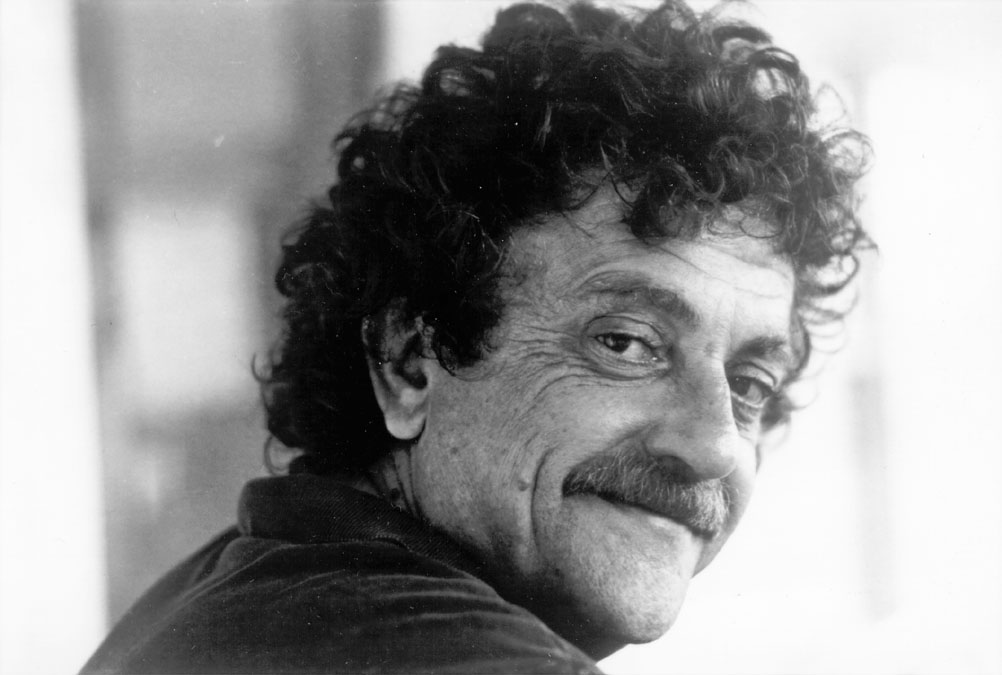
Kurt Vonnegut is firmly established as one of the leading figures in 20th-century American literature, with seventeen novels, several plays, and scores of short stories to his credit. Vonnegut’s works have been translated into several languages and reviewed and analyzed by critics and scholars worldwide. His work has also been adapted for or influenced numerous television, theatre, and movie productions, and has inspired musicians, including the Grateful Dead, Ambrosia, and groups in Canada and the Netherlands.
Born and raised in Indianapolis, Vonnegut spent three years pursuing a degree in chemistry from Cornell University before joining the Army and being sent to Europe in 1944. He was captured by the Germans during the Battle of the Bulge, and survived the Dresden bombings as a POW, an experience that was the basis for his bestselling novel, Slaughterhouse-Five.
Upon his return to the U.S., Vonnegut received the Purple Heart. After attending the University of Chicago, he obtained a job as a reporter for the Chicago City News Bureau. Vonnegut later worked as a publicist for General Electric, taught English at a private school, and opened the second Saab dealership in North America. In 1971, he received an M.A. in anthropology from the University of Chicago.
His creative writing career began in the late 1940s, with short stories published in several large-circulation magazines, including Collier’s and the Saturday Evening Post. Vonnegut’s first novel, Player Piano, was published in 1951 and became a Doubleday Science Fiction Book Club selection in 1953. His later novels include The Sirens of Titan (1959), Cat’s Cradle (1963), God Bless You, Mr. Rosewater (1965), Breakfast of Champions (1973), and Hocus Pocus (1990).
Vonnegut has held prestigious teaching appointments at the University of Iowa Writers’ Workshop, Harvard University, and the City University of New York (where he served as Distinguished Professor of English Prose). He is the past recipient of a Guggenheim Fellowship (to research Slaughterhouse-Five) and a National Institute of Arts and Letters grant. Vonnegut was elected vice president of P.E.N. American Center, and vice president of the National Institute of Arts and Letters. In 2000, he was appointed State Author of New York. He resides in New York City.
2001 Symposium Keynote Address
“The Moral Authority of the Presidency”
Doris Kearns Goodwin
7:00 p.m., Thursday, April 19, 2001
Goodrich Chapel
Historian/author Doris Kearns Goodwin is acclaimed for her unique ability to illuminate the drama and the reality of the life and times of some of the twentieth century’s most powerful figures. Her four books on Lyndon Johnson, Franklin and Eleanor Roosevelt, the Fitzgerald and Kennedy families—and herself—have won numerous awards and have made the New York Times bestseller list. Three have been or will be made into full-length movies.
Goodwin worked as an assistant to President Lyndon Johnson during his last year in the White House. The relationship lasted for the rest of Johnson’s life, with Goodwin later assisting Johnson with his memoirs. A 10-year stint as professor of government at Harvard University, teaching a course on the American Presidency, led Goodwin to write No Ordinary Time: Franklin and Eleanor Roosevelt: The American Homefront in World War II, which won the 1995 Pulitzer Prize for history.
Along with politics, Goodwin is passionate about baseball, a lifelong obsession detailed in her bestselling memoir, Wait Till Next Year, described by the Washington Post as being “in the grand tradition of girlhood memoirs, dating from Louisa May Alcott to Carson McCullers and Harper Lee.” Goodwin was a consultant for Ken Burns’ PBS documentary, “The History of Baseball” and counts among her accomplishments being the first woman to enter the Red Sox locker room.
Goodwin writes regularly on politics and baseball, and often shares her views on such programs as “The News Hour with Jim Lehrer” and NBC and MSNBC news broadcasts.
A former Woodrow Wilson Fellow, Goodwin is also a winner of the Charles Frankel Prize from the National Endowment for the Humanities and the Sara Josepha Hale medal. A graduate of Colby College, Goodwin earned her doctorate at Harvard University.
2000 Symposium Keynote Address
“Geological Immensity and Human Insignificance: The Proper Scale of Our Ecological Crisis”
Stephen Jay Gould
7:00 p.m., Tuesday, April 18, 2000
Goodrich Chapel
A brilliant interpreter of science and its complex social consequences, Stephen Jay Gould speaks internationally on a broad range of controversial subject matter, from the scientific arguments for racial equality, to theories on the nature of excellence, to mankind’s amazing—but not miraculous—origins, to Darwin’s revolutionary breakthrough in thought.
Gould is especially interested in mathematical problems of growth and form applied to the evolution of lineages. He has taught at Harvard University since 1967 and is now professor of geology, professor of zoology, and curator for invertebrate paleontology in the University’s Museum of Comparative Zoology.
The author of more than 200 consecutive essays for his Natural History Magazine column “This View of Life,” Gould is also a contributor to Discover Magazine. Gould has served as the president of the Paleontological Society and the Society for the Study of Evolution. He was in the first group awarded the prestigious MacArthur Foundation Prize Fellowship. He has also received the Silver National Medal of the Zoological Society of London and the Edinburgh Medal from the city of Edinburgh. He won the National Magazine Award for Essays and Criticism in 1980 and in 1981 received an American Book Award for The Panda’s Thumb and the National Book Critic’s Circle Award for The Mismeasure of Man. Discover Magazine named him its Scientist of the Year in 1982.
His other books include: Full House, Ever Since Darwin, The Flamingo’s Smile, Hen’s Teeth and Horse’s Toes, An Urchin in the Storm, Wonderful Life, Bully for Brontosaurus, and Dinosaur in a Haystack.
Gould holds an A.B. degree from Antioch College and a Ph.D. from Columbia University.
1999 Symposium Keynote Address
“Geological Immensity and Human Insignificance: The Proper Scale of Our Ecological Crisis”
Wade Davis
11:00 a.m., Thursday, April 15, 1999
Norris 101

Wade Davis is an ethnobotanist and photographer whose research has spanned cultures and environments around the globe. Working for the Harvard Botanical Museum, Davis lived with tribal groups in eight Latin American nations while making some 6,000 botanical collections. His work in Haiti, investigating folk preparations implicated in the creation of zombies, inspired him to write two books, Passage of Darkness and The Serpent and the Rainbow . The latter was an international bestseller which later became a major motion picture. Davis has also produced books and television documentaries on his travels and research in Borneo, Papua New Guinea and Native American tribes in Canada and the United States.
Davis’ other books include Nomads of the Dawn , Shadows in the Sun , and Penan: Voice for the Borneo Rain Forest , which is being adapted by Warner Bros. for feature film release. He has published more than 50 scientific articles and has written for such publications as Newsweek , Premiere , Outside , Omni and Harper’s . Davis’ documentaries for television include the Discovery Channel’s 13-part series, “Earthguide.”
In addition to continuing his ethnobotanical research, Davis lectures widely. He has addressed the American Museum of Natural History, the Smithsonian Institution, the National Geographic Society and the Royal Ontario and British Columbia Museums, along with many other national scientific organizations and more than 50 universities.
Davis holds degrees in anthropology and biology, and received a doctorate in ethnobotany from Harvard University.